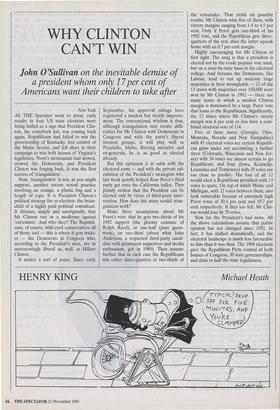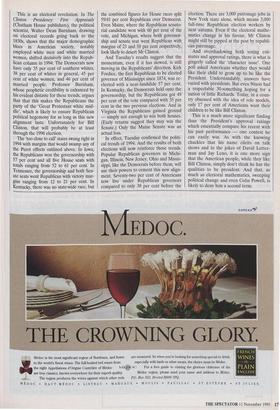WHY CLINTON CAN'T WIN
John O'Sullivan on the inevitable demise of a president whom only 17 per cent of Americans want their children to take after
New York AS THE Spectator went to press, early results in four US state elections were being hailed as a sign that President Clin- ton, the comeback kid, was coming back again. Republicans had failed to win the governorship of Kentucky, lost control of the Maine Senate, and fell short in their campaign to win both houses of Virginia's legislature. Newt's momentum had slowed, crowed the Democrats, and President Clinton was forging back. It was the first success of 'triangulation'.
Now, 'triangulation' is not, as you might suppose, another arcane sexual practice involving an orange, a plastic bag and a length of rope. It is President Clinton's political strategy for re-election: the brain- child of a highly paid political consultant. It dictates, simply and unoriginally, that Mr Clinton run as a moderate against `extremists'. And who they? The Republi- cans, of course, wild-eyed conservatives all of them; and — this is where it gets tricki- er — the Democrats in Congress who, according to the President's men, are as unreasoningly liberal as, well, as Hillary Clinton.
It makes a sort of sense. Since early September, his approval ratings have registered a modest but steady improve- ment. The conventional wisdom is that, although triangulation may create diffi- culties for Mr Clinton with Democrats in Congress and with the party's liberal interest groups, it will play well in Pocatello, Idaho. Barring miracles and ex-generals, he is as good as elected already.
But this optimism is at odds with the electoral sums — and with the private cal- culation of the President's strategists who last week quietly helped Ross Perot's third party get onto the California ballot. They plainly reckon that the President can be elected only by virtue of third-party inter- vention. How does this more sordid trian- gulation work?
Make three assumptions about Mr Perot's vote: that he gets two-thirds of his 1992 support (the gloomy estimate of Ralph Reed), or one-half (pure guess- work), or one-third (about what John Anderson, a respected third-party candi- date with prominent supporters and media enthusiasm, got in 1980). Then assume further that in each case the Republicans win either three-quarters or two-thirds of the remainder. That yields six possible results. Mr Clinton wins five of them, with victory margins ranging from 1.4 to 4.5 per cent. Only if Perot gets one-third of his 1992 vote, and the Republican gets three- quarters of the rest, does the latter squeak home with an 0.7 per cent margin.
Highly encouraging for Mr Clinton at first sight. The snag is that a president is elected not by the crude popular vote total, but on a state-by-state basis in the electoral college. And because the Democrats, like Labour, tend to run up uselessly large majorities in their strongholds — 12 of the 13 states with majorities over 150,000 were won by Mr Clinton in 1992 — there are many states in which a modest Clinton margin is dominated by a large Perot vote that leans to the Republicans. Significantly, the 12 states where Mr Clinton's victory margin was 6 per cent or less have a com- bined electoral vote of 114.
Five of these states (Georgia, Ohio, Montana, Nevada and New Hampshire) with 45 electoral votes are certain Republi- can gains under any accounting; a further three (Colorado, Wisconsin and New Jer- sey) with 34 votes are almost certain to go Republican; and four (Iowa, Kentucky, Louisiana and Tennessee) with 35 votes are too close to predict. The loss of all 12 would elect a Republican president with 13 votes to spare. On top of which Maine and Michigan, with 22 votes between them, also look vulnerable because of extremely high Perot votes of 30.4 per cent and 19.7 per cent respectively. If they too fell, Mr Clin- ton would lose by 70 votes.
Now for the President's bad news. All the above calculations assume that public opinion has not changed since 1992. In fact, it has shifted dramatically, and the electoral landscape is much less favourable to him than it was then. The 1994 elections gave the Republican Party control of both houses of Congress, 30 state governorships, and close to half the state legislatures. This is an electoral revolution. In The Clinton Presidency: First Appraisals (Chatham House publishers), the political scientist, Walter Dean Burnham, drawing on electoral records going back to the 1830s, shows that the major demographic blocs in American society, notably employed white men and white married women, shifted decisively into the Repub- lican column in 1994. The Democrats now have only 35 per cent of southern whites, 38 per cent of whites in general, 45 per cent of white women, and 46 per cent of married people. Professor Burnham, whose prophetic credibility is enhanced by his evident distaste for these trends, argues that that this makes the Republicans the Party of the 'Great Protestant white mid- dle', which is likely to ensure Republican political hegemony for as long as this new alignment lasts. Unfortunately for Bill Clinton, that will probably be at least through the 1996 election.
The 'too close to call' states swung right in 1994 with margins that would swamp any of the Perot effects outlined above. In Iowa, the Republicans won the governorship with 57 per cent and all five House seats with totals ranging from 52 to 61 per cent. In Tennessee, the governorship and both Sen- ate seats went Republican with victory mar- gins ranging from 12 to 21 per cent. In Kentucky, there was no state-wide race, but the combined figures for House races split 59/41 per cent Republican over Democrat. Even Maine, where the Republican senato- rial candidate won with 60 per cent of the vote, and Michigan, where both governor- ship and senate seat went Republican with margins of 23 and 10 per cent respectively, look likely to desert Mr Clinton.
And Tuesday's results suggest that the momentum, even if it has slowed, is still moving in the Republicans' direction. Kirk Fordice, the first Republican to be elected governor of Mississippi since 1874, was re- elected with a near-landslide 57 per cent. In Kentucky, the Democrats held onto the governorship, but the Republicans got 49 per cent of the vote compared with 35 per cent in the two previous elections. And in Virginia the Republicans gained ground — simply not enough to win both houses. (Early returns suggest they may win the Senate.) Only the Maine Senate was an actual loss.
In effect, Tuesday confirmed the politi- cal trends of 1994. And the results of both elections will now reinforce those trends. Popular Republican governors in Michi- gan, Illinois, New Jersey, Ohio and Missis- sippi, like the Democrats before them, will use their powers to cement this new align- ment. Seventy-two per cent of Americans now live under Republican governors compared to only 38 per cent before the election. There are 3,000 patronage jobs in New York state alone, which means 3,000 full-time Republican election workers by next autumn. Even if the electoral mathe- matics change in his favour, Mr Clinton might still be pipped at the post by republi- can patronage.
And overshadowing both voting esti- mates and approval ratings, there is what is gingerly called the 'character issue'. One poll asked Americans whether they would like their child to grow up to be like the President. Understandably, answers have varied with presidents. But even Nixon had a respectable 30-something hoping for a nation of little Richards. Today, in a coun- try obsessed with the idea of role models, only 17 per cent of Americans want their children to be like Bill Clinton.
This is a much more significant finding than the President's approval ratings which essentially compare his recent with his past performance — one contest he can easily win. As with the knowing chuckles that his name elicits on talk shows and in the jokes of David Letter- man and Jay Leno, it is one more sign that the American people, while they like Bill Clinton, simply don't think he has the qualities to be president. And that, as much as electoral mathematics, sweeping political change and even Colin Powell, is likely to deny him a second term.



















































































 Previous page
Previous page